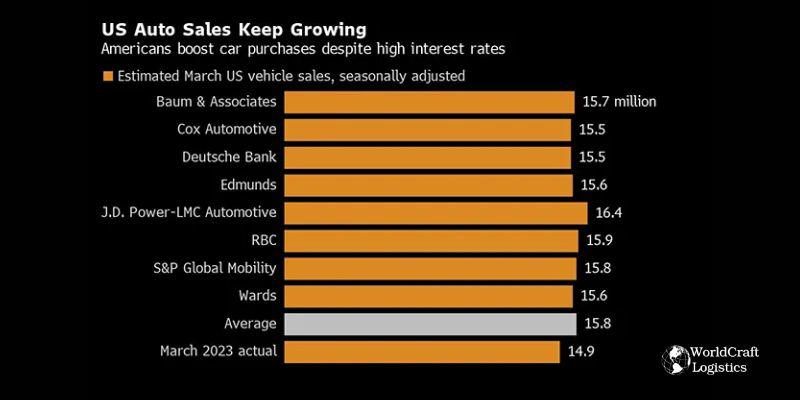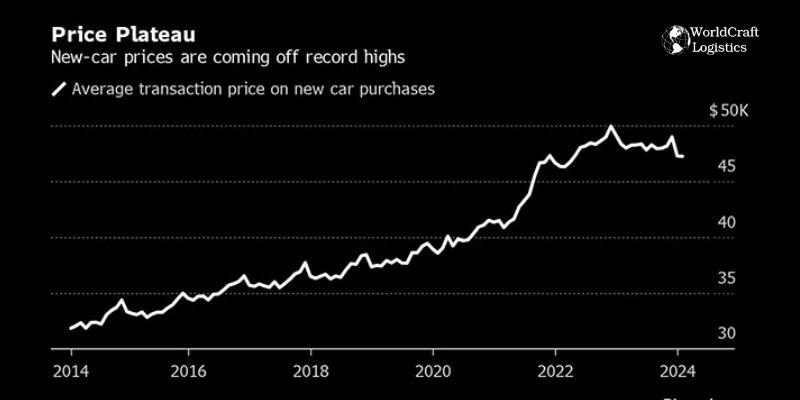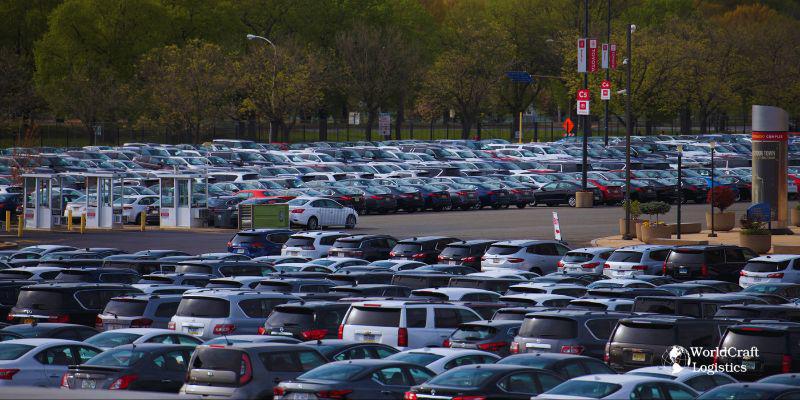
Starting June 1st, 2023 Our warehouse fee will be $0.65/cubic foot per month
In effort to lower the warehouse storage fee during inflation, we have went narrow aisle racking.This construction took us four months but the project is finally completed. With narrow aisle racking, we are able to drop storage by 24%.We as partners will go through this inflation together.
04/02/2024
Despite expectations for a slowdown, the US auto market continued to show resilience, achieving another quarter of sales growth. However, the soaring cost of financing pushed Americans towards choosing more budget-friendly vehicle options

Toyota Motor Corp. and Honda Motor Co. experienced significant increases in U.S. sales, defying expectations of a broader slowdown, with demand for lower-priced models driving the momentum.
Toyota reported a more than 20% surge in deliveries in the first quarter, fueled by strong performances from the compact Corolla sedan and RAV4 crossover. Similarly, Honda saw a 17% uptick in sales, attributed to the popularity of its CR-V crossover and Civic compact.
Despite General Motors Co. witnessing a 1.5% decline in overall units sold due to reduced corporate fleet purchases, its retail sales increased by 6%, particularly driven by the success of the Chevrolet Trax compact.
These early results underscore the significance of affordability for consumers, especially after years of pandemic-related shortages and high interest rates that inflated costs. The pricing dynamics that boosted automaker profits during the pandemic are now fading as production normalizes, leading car companies to offer more incentives as prices begin to decline with rising inventories.
In the first quarter, budget cars and compact SUVs experienced substantial market share gains, with sedan growth matching that of SUVs at Toyota. Conversely, large pickup trucks, traditionally one of the industry's priciest segments, saw a decline in January and February. To combat inflation concerns and stimulate demand in the sluggish electric vehicle market, several brands like Jeep, Tesla, and Ford reduced prices.
David Oakley, an analyst with GlobalData, expressed surprise at the market's resilience, noting that affordability remains a significant concern for the industry. However, for now, it appears that they are weathering the storm as consumers find ways to make their purchases work.

Other articles for you:
👉 Bill Empowers States to Waive Truck Weight Limits
👉 Trucks are becoming more advanced, and this is causing dissatisfaction among truck drivers
👉 Chinese cars exported to Australia must be decontaminated, topping the list of 'infected'
GM witnessed a decline in sales of its large and high-priced SUVs such as the Chevrolet Tahoe and GMC Yukon, while demand for its new Chevy Trax, an affordable compact SUV priced at just $20,400, surged almost six times over. This shift reflects the company's strategic emphasis on offering more accessible vehicle options.
Despite ongoing challenges in resolving production issues within its electric vehicle battery operations, particularly concerning the production of the new Ultium battery pack, GM achieved its best quarter with the new generation of EVs. Sales figures include 5,800 units of the Cadillac Lyriq and 1,668 electric Hummer trucks, signaling a promising trajectory in the EV market.
The industry's annual sales pace, measured by the seasonally adjusted annual rate, saw an increase to approximately 15.8 million in March compared to 14.9 million a year prior, according to analysts surveyed by Bloomberg. First-quarter sales totaled 3.8 million vehicles, marking a 6% rise from the previous year but a 3.1% decline from the fourth quarter of 2023, as reported by Edmunds.
Toyota, in its April 2 announcement, revealed U.S. new vehicle sales of 565,098 units for the quarter, with stronger growth seen in its Toyota brand compared to its luxury Lexus line. Notably, the company experienced nearly a 40% increase in Corolla sales and a nearly 50% rise in RAV4 sales, further solidifying its position in the market.

Kia America experienced a slight dip of 2.5% in sales over the three-month period, despite a notable 10% increase in sales of its compact Forte car. Hyundai Motor Co. saw its U.S. sales remain relatively flat during the quarter.
The appeal of fully electric vehicles appears to be waning among consumers due to concerns about the inadequate charging infrastructure and high prices. Although electric vehicle sales saw an uptick compared to the previous year, volume in the first quarter likely saw a sequential decline for the first time since the early stages of the pandemic, according to insights from Cox Automotive. Conversely, sales of hybrid vehicles, offering both good fuel economy and price points closer to their gas-powered counterparts, are on the rise.
Steve Gates, a dealer with a presence across Kentucky, Tennessee, and Indiana, noted that first-quarter sales surpassed his expectations, despite ongoing concerns about affordability, particularly for hybrids. He highlighted the challenge of meeting demand from customers priced out of new models, indicating the strain on consumers' finances. Gates emphasized the persistent demand, particularly for vehicles like Toyota's RAV4 plug-in variant, suggesting that if available, these models alone could sustain his business.

Many consumers prioritize affordability when purchasing a vehicle. Cheap cars typically have lower upfront costs, making them more accessible to a wider range of buyers, including those on tight budgets or with limited financial resources. So choosing a cheaper car helps to mitigate overall expenses and manage their budget effectively.
Cheaper cars often come with smaller engines and better fuel efficiency, which can result in long-term cost savings on fuel expenses. With rising fuel prices, many consumers prioritize vehicles that offer better mileage per gallon.
Overall, the decision to buy a cheap car can be influenced by a combination of financial considerations, lifestyle preferences, and individual priorities.
If you buy a car and need to transport it home or somewhere far away around the world, don't miss our service article: 👉 Car Export Service From USA With Cheapest Cost & Safety
Content
I am working in-house at Worldcraft Logistics. With my experience as the position, I have written more than 200 knowledge sharing articles, edited new news sections and created interesting video content for the company's Tiktok and Youtube channels.

Hot News
08/05/2024

Hot News
02/23/2023

Hot News
02/23/2023

Hot News
02/06/2023
Hot News
02/07/2023